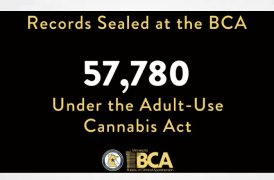Gonzalez v. Raich 545 U.S. 1 (2005)
Opinion by Chief Justice Stevens
Issue Presented:
Does Congress’ authority to regulate interstate commerce extend to the regulation of in-state use and production of medical cannabis?
Rule:
Congress may regulate the use and production of home-grown cannabis as this activity, taken in the aggregate, could rationally be seen as having a substantial economic effect on interstate commerce.
Application:
The Commerce Clause found in the Constitution under Article I, §8, clause 3, vests Congress the power to regulate interstate commerce. However, Congress only has the authority to regulate if the action or activity: affects or uses channels of interstate (e.g., the internet, highways, railroads), uses an instrumentality of interstate commerce to transport (e.g., cars, airplanes, trains), or if the action or activity has a “substantial effect” on interstate commerce. In Gonzalez v. Raich, Congress relied on the decision in Wickard v. Filburn where the court held that Congress may regulate the intrastate cultivation of wheat because that activity in the aggregate would impose substantial effects on interstate commerce. Through the New Deal, Congress enacted the Agricultural Adjustment Act of 1938 which imposed a maximum quota on the amount of wheat the farmers could produce. This was enacted in response to a nationwide wheat surplus relative to demand. In Wickard, Respondent Filburn operated a small dairy farm in Ohio where he grew wheat primarily for home consumption to feed his livestock. Farmer Filburn had produced more than his allotted quota and received a fine for the surplus of his wheat. Filburn filed suit against Wickard, the Secretary of Agriculture, seeking to prohibit enforcement of the act arguing that the wheat was not placed into the stream of interstate commerce, and his wheat production cannot be controlled by Congress under the commerce clause because it was not crossing state lines, nor was he selling it. District court ruled in favor of Filburn, finding the act unconstitutional, and was appealed to the Supreme Court of the United States (SCOTUS). SCOTUS applied the aggregation doctrine which hypothetically combines all instances of a given activity and then asks whether that activity considered in the aggregate would impose a substantial effect on interstate commerce. In Wickard, SCOTUS looked not only at Filburn’s wheat production but the effect on interstate commerce of all wheat grown from home consumption across the nation. The Court reasoned that if Congress couldn’t regulate small amounts of wheat, then large aggregate amounts of wheat would escape congressional regulation as well. Thus, Filburn’s activities substantially affected interstate commerce because if he was not growing the wheat himself, he would be buying wheat on the open national market, which was the purpose of the Agricultural Adjustment Act.
SCOTUS decision in Gonzalez v. Raich mirrors Wickard where the Court held that Congress could regulate the supply and home-consumption of a commodity when, if viewed in the aggregate, would have a substantial effect on interstate commerce. In 1996, California passed the Compassionate Use Act that allowed its citizens to cultivate and use cannabis for medical purposes. Diane Monson and Angel Riach, both California residents, had been prescribed cannabis to treat severe medical problems. Monson grew cannabis on her property where the DEA seized and destroyed six of her cannabis plants. Monson and Riach argued that their growth and consumption of cannabis was a non-economic activity because nothing was bought or sold, there was a lack of jurisdictional element, a lack of proof that their actions would have a substantial effect on interstate commerce, and relied on Federalism to allow them to experiment with the benefit of a policy enacted by California. Unfortunately, SCOTUS did not agree. Relying on Wickard, Chief Justice Stevens explained that in the aggregate, home-grown cannabis, just like home-grown wheat, had a substantial effect on interstate commerce. First, that the growth affected the interstate supply of cannabis because if people could grow it, they would not buy it in the regulated market. Second, because there was such a high demand for cannabis in the interstate market as a whole, allowing citizens to grow medical cannabis will inevitably allow cannabis to cross state lines. Lastly, the Court also found that home-grown cannabis does affect economic activity. In Lopez v. Morrison, SCOTUS defined “economic” as the production, distribution, and consumption of commodities. Applying this to the case at bar, Monson used supplies from the state of California such as water, lamps, and lumber, however, those supplies have a causal connection to interstate commerce and are therefore considered an economic activity. Thus, the Court found that Congress had acted rationally in determining that the in-state medical home-grown cannabis had a substantial effect on interstate commerce.
Conclusion
Congress can regulate a purely intrastate activity that is not itself “commercial,” in that it is not produced for sale, if it concludes that failure to regulate that class of activity would undercut the regulation of the interstate market in that commodity. SCOTUS reversed the Court of Appeals decision and upheld that Congress was acting constitutionally.

Kathryn Venezia
Kathryn Venezia is a second-year law student at New York Law School, interested in the zoning, social-equity, and licensing.

















